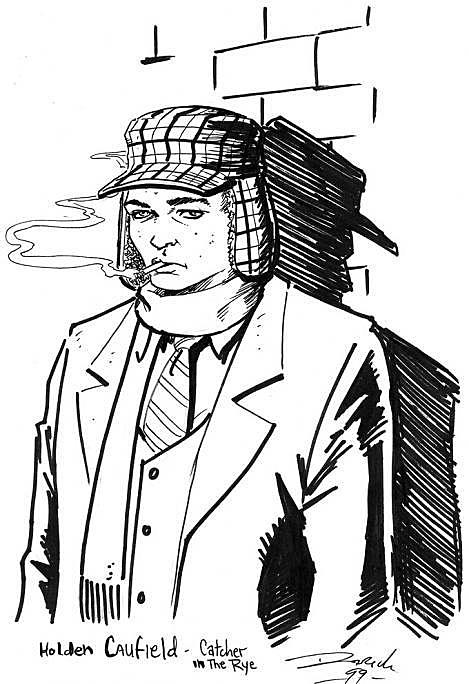A Movie That Should Never, Ever Be Made
The Telegraph reports, possibly prematurely, that J.D Salinger’s The Catcher In The Rye may now be optioned as a feature film following its author’s death earlier this year. The mercurial Salinger vowed not to let Hollywood get its hands on his work again after they turned one of his early short stories into the 1950 flop, My Funny Heart (In an issue of Time from February that year, it had the misfortune to be reviewed alongside The Third Man. The writer’s charitable verdict: “the kind of movie that gives women a good cry and men a bad time”). Mortality and security may have at one point made him seriously consider leaving unsold rights to his wife and children; instead, the article suggests a retroactive estate tax may now be the trigger for the executors to walk out from his New Hampshire bunker and make their offering to the vultures.
Let’s imagine how an unfattened version of this story plays out: our teenage hero skips boarding school and spends three days in New York City. He gets beaten up, intoxicated, feels threatened, embarks on internal flights of fancy. His encounters with others are brief, tense and awkward. Looking pallid, he stumbles, scowling, around a Natural History Museum - he is then reunited with his much younger sister whom he takes to a carousel at the zoo. The ending is, and must be, indeterminate. Not a lot to it, is there?
Which is not to be reductive to the book, still furious, feral and incredible. But what mortar would a film fill its bricks in with? Huge, deadening slabs of Caulfield’s own narration? ‘Flashback’ sequences (cue harp, visions of Allie)? Whirlygig hand-held camera, that hoary shorthand for someone on the brink of a breakdown? Catcher resists the pacing and development, and the same cinematic tropes, that made something excellent out of adaptations of everything from Pride & Prejudiceto ‘Do Androids Dream Of Electric Sheep?’. It’s its own beast.
Oh, and another thing - any blithely charismatic treatment of Caulfield will be nothing less than a cheat. He’s an unreliable narrator of towering proportions, and the pull between our natural empathy for his crusade as first-time adolescent readers, and our recognition of what’s really going down, is what makes this book a heart-render. Letting us see a superficial binary of ‘Holden vs. the trite, disingenuous World’ misreads the book, but letting on to the fact that he’s just scared, sick and doomed also neuters and cheapens its spirit. The tension Salinger subjects us to on every page of the book won’t be replicated easily on film, and its creators run the very real risk of birthing something that makes a resounding thud between two stools.
Not this would ultimately stop anyone. Catcher’s counter-cultural cache makes it big money - namedropped by everyone from Matt Groening to Belle & Sebastian, emulated by both likeable homages and absolute fucking howlers. So, given the chance, someone will roll with this for big money. Their pawns, behind and in front of the camera, will be the victims of their own lingering teenage hubris. They are Holden; Catcher In The Rye spoke to them more than it did everyone else; their manifest destiny is to channel Salinger divinely and produce the definitive cinematic version of his masterwork. Whether that in fact comes from stripping his clan of their creative assets in a firesale is a peripheral issue. Spoiler: Everyone turns out to be a phony.

